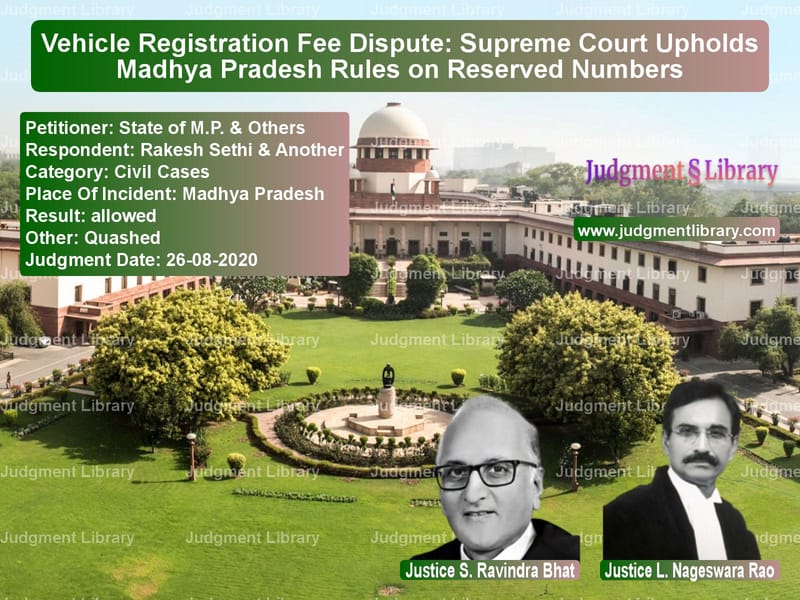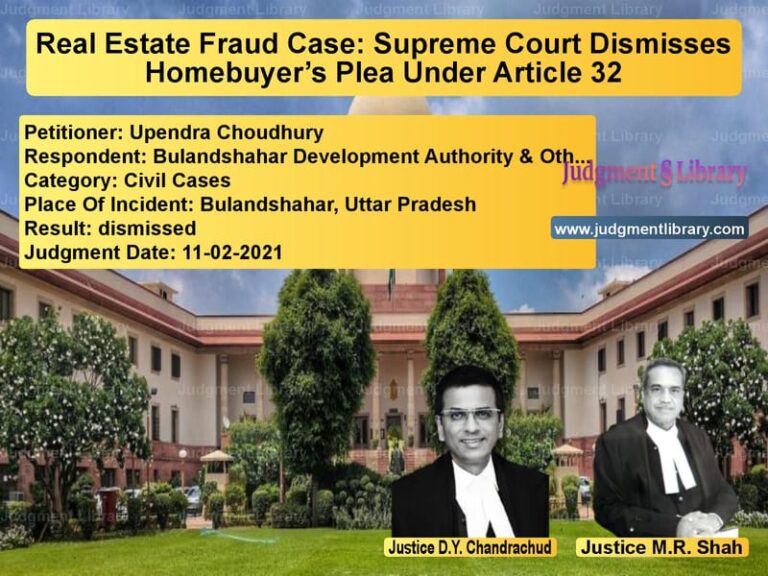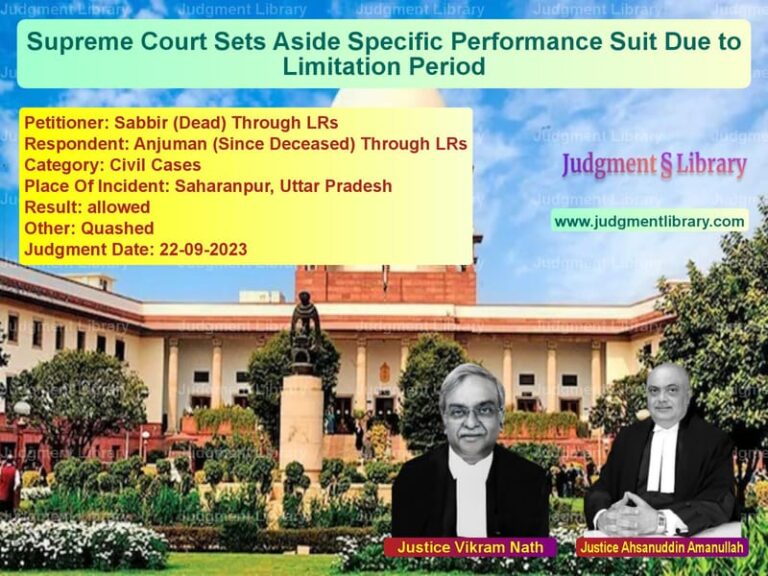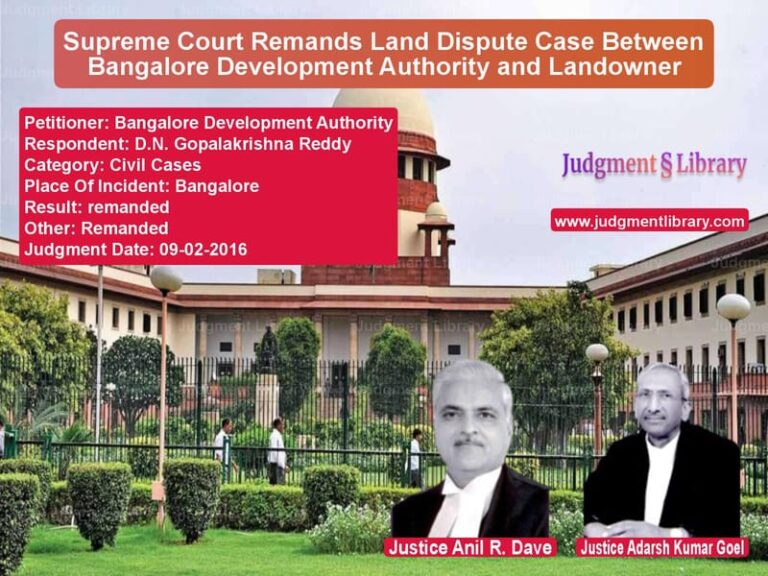Vehicle Registration Fee Dispute: Supreme Court Upholds Madhya Pradesh Rules on Reserved Numbers
The case of State of M.P. & Others vs. Rakesh Sethi & Another revolved around the legality of Rule 55A of the Madhya Pradesh Motor Vehicles Rules, 1994, which imposed a special fee for reserving specific vehicle registration numbers. The Madhya Pradesh High Court had ruled that the provision was unconstitutional and beyond the state’s power, leading to an appeal before the Supreme Court.
Background of the Case
The respondent, Rakesh Sethi, had purchased a motorcycle in May 2004 and applied for registration. He sought a specific number (MP-KL-4646) but was denied because he had not paid the prescribed fee under Rule 55A. Instead, he was allotted another number, which he refused. He challenged Rule 55A before the Madhya Pradesh High Court, arguing that it conflicted with the Motor Vehicles Act, 1988.
The High Court ruled in his favor, declaring that the state had no authority to impose such a fee. The state government appealed this decision before the Supreme Court, arguing that the rule was legally valid and within its powers under the Motor Vehicles Act.
Arguments by the Petitioner (State of M.P.)
- The state argued that it had the authority under Section 41(6) of the Motor Vehicles Act to assign distinguishing registration marks.
- Section 65 of the Act grants states the power to frame rules regarding vehicle registration.
- The prescribed fee was a legitimate charge for a service rendered in reserving specific registration numbers upon request.
- Under Section 211, the state was permitted to levy fees for various services related to motor vehicle registration.
- The High Court had misinterpreted the law by concluding that the central government had exclusive authority over registration fees.
Arguments by the Respondent (Rakesh Sethi)
- The respondent argued that Rule 55A was unconstitutional as it conflicted with the central government’s power under Section 41(2).
- Section 41(2) grants the central government exclusive authority to prescribe fees for vehicle registration.
- The fee under Rule 55A was arbitrary and imposed an unnecessary financial burden on vehicle owners.
- The registration number allocation process was purely administrative and should not involve additional fees.
Supreme Court’s Observations
The Supreme Court examined the interplay between Sections 41, 65, and 211 of the Motor Vehicles Act. The Court made the following key observations:
- Section 41(6) empowers states to assign distinguishing registration marks to vehicles.
- Section 65(1) allows states to frame rules on matters not covered under Section 64, including vehicle registration.
- Section 211 broadly permits states to levy fees for services rendered, including assigning specific registration numbers.
- The rule-making power of states should not be interpreted narrowly, especially when the law does not explicitly prohibit them from imposing a fee for a legitimate service.
- The High Court erred in concluding that the state lacked the authority to prescribe a fee for assigning specific registration numbers.
The Court further emphasized that conflicts between state and central laws should not be readily inferred. The principle of harmonious construction should be applied to ensure that both sets of laws coexist without contradiction.
It stated:
“Conflict of laws or repugnancy between state and central laws should not be readily inferred, but rather, the courts should first attempt at harmonizing the two sets of apparently conflicting norms.”
Precedents and Legal Interpretation
The Supreme Court referred to previous rulings that reinforced the states’ power to impose fees for services rendered. It highlighted:
- In D.K. Trivedi & Sons v. State of Gujarat, the Court held that states have the power to impose fees for services they provide, even if the central law governs the subject matter.
- In Jaintia Hill Truck Owners Association v. Shailang Area Coal Dealer, the Court ruled that states could levy fees for specific services, provided they do not conflict with central laws.
- In Indian Medical Association v. Union of India, the Court interpreted the term “allot” as including the power to apportion resources and impose a fee for such allocation.
Based on these rulings, the Supreme Court determined that Rule 55A did not conflict with the central government’s powers under Section 41(2) and was a legitimate exercise of the state’s authority.
Final Judgment and Implications
The Supreme Court allowed the appeal and set aside the High Court’s decision. It upheld Rule 55A, ruling that:
“The assignment of ‘distinctive marks’ (registration numbers) to motor vehicles, including the power to reserve and allocate them for a specific fee, is a distinct service for which states or their authorities are entitled to charge a prescribed fee.”
The ruling clarifies that state governments can charge fees for specific registration numbers, provided they follow the prescribed legal framework. It also sets a precedent for future cases involving the division of power between state and central governments in regulatory matters.
Petitioner Name: State of M.P. & Others.Respondent Name: Rakesh Sethi & Another.Judgment By: Justice S. Ravindra Bhat, Justice L. Nageswara Rao.Place Of Incident: Madhya Pradesh.Judgment Date: 26-08-2020.
Don’t miss out on the full details! Download the complete judgment in PDF format below and gain valuable insights instantly!
Download Judgment: State of M.P. & Othe vs Rakesh Sethi & Anoth Supreme Court of India Judgment Dated 26-08-2020.pdf
Direct Downlaod Judgment: Direct downlaod this Judgment
See all petitions in Motor Vehicle Act
See all petitions in Compensation Disputes
See all petitions in Legal Malpractice
See all petitions in Judgment by S Ravindra Bhat
See all petitions in Judgment by L. Nageswara Rao
See all petitions in allowed
See all petitions in Quashed
See all petitions in supreme court of India judgments August 2020
See all petitions in 2020 judgments
See all posts in Civil Cases Category
See all allowed petitions in Civil Cases Category
See all Dismissed petitions in Civil Cases Category
See all partially allowed petitions in Civil Cases Category







